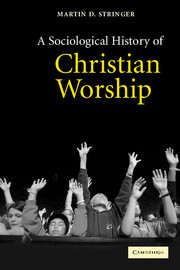Book contents
- Frontmatter
- Contents
- Preface and acknowledgements
- Introduction: Discourse, devotion and embodiment
- 1 Early Christian worship, texts and contexts to ad 300
- 2 Worship and the Christianisation of public space, 300–600
- 3 Hegemonic discourses in the worship of empires, 600–900
- 4 The dominant discourse of cosmological Christianity, 900–1200
- 5 Accessing the demotic discourses of devotion, 1200–1500
- 6 Worship and the rise of humanistic discourses, 1500–1800
- 7 The globalisation of Christian worship, 1800–2000
- Bibliography
- Index
6 - Worship and the rise of humanistic discourses, 1500–1800
Published online by Cambridge University Press: 03 December 2009
- Frontmatter
- Contents
- Preface and acknowledgements
- Introduction: Discourse, devotion and embodiment
- 1 Early Christian worship, texts and contexts to ad 300
- 2 Worship and the Christianisation of public space, 300–600
- 3 Hegemonic discourses in the worship of empires, 600–900
- 4 The dominant discourse of cosmological Christianity, 900–1200
- 5 Accessing the demotic discourses of devotion, 1200–1500
- 6 Worship and the rise of humanistic discourses, 1500–1800
- 7 The globalisation of Christian worship, 1800–2000
- Bibliography
- Index
Summary
INTRODUCTION: ‘DE-CHRISTIANISATION’
It is possible to see this chapter, at one level, as simply a reversal of Chapter 2. In that chapter we looked at the way in which the gradual Christianisation of the late Roman Empire affected the development of worship, and how the increasingly public nature of that worship contributed to the process of Christianisation. In this chapter, we could argue that, beginning with the Reformation in Western Europe, we will be looking at the gradual process of de-Christianisation and the impact this has had on liturgy and worship. We could also argue, fairly convincingly, that this process of de-Christianisation was helped by the increasing privatisation of worship from the fourteenth century onwards. To look at the situation as simply and as starkly as this, however, would be a mistake.
The first question we have to ask is what, if anything, performed the role of the Christian discourses in the process of Christianisation: what was it that was driving Christianity out of its role as the dominant discourse in society? The obvious answer might well be ‘science’, or ‘modernism’ or even ‘rationalism’. These have all, in their different ways, become central parts of the dominant discourse of the Western world today. I would want to suggest, however, that neither science in itself, nor modernism, nor rationalism, are the discourses that have been driving Christianity out of its previous position of dominance.
- Type
- Chapter
- Information
- A Sociological History of Christian Worship , pp. 179 - 208Publisher: Cambridge University PressPrint publication year: 2005

